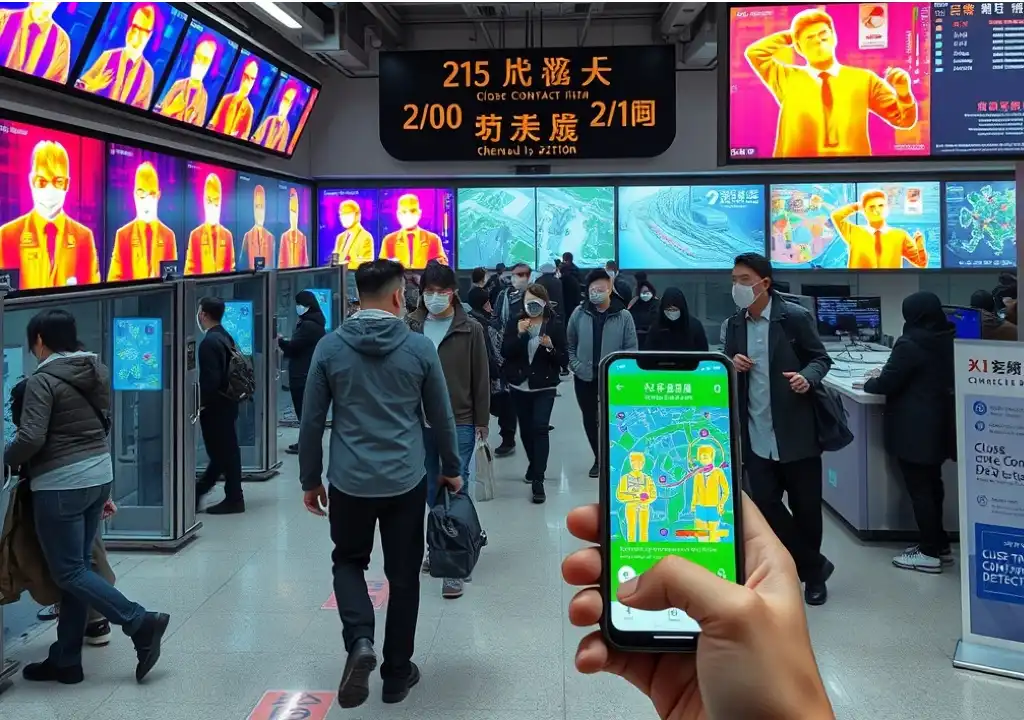Authorities boost surveillance efforts and deploy advanced AI technology to manage the epidemic.
Chengdu, China – At the entrance of Chengdu’s East Railway Station, staff member Fu Guobin monitors a screen filled with infrared visuals showing incoming passengers. Each individual is tagged with a temperature reading, thanks to new thermal imaging systems.
“This technology has made my job much easier,” Fu shared from his post. “Before this, I had to check everyone’s temperature manually with ear thermometers, which sometimes failed. This system is a huge improvement.”
With over 50,000 people using the station daily, accurate and rapid fever detection—one of the primary symptoms of the coronavirus—is vital. Thermal scanners have been deployed across major train stations in China as part of a wider government strategy to use artificial intelligence and big data to tackle the outbreak, which originated in Hubei province and has since spread to 56 countries.
Fu recalled a recent incident involving a woman from Henan whose temperature read 37.9°C. “After repeated checks, her temperature stayed the same. We isolated her in a designated room, collected her travel data, and informed health officials,” he said.
If the passenger tested positive, authorities would notify everyone who shared her train car. This is possible due to regulations mandating real-name registrations for public transport, allowing detailed tracking.
Now, Chinese tech firms are advancing these systems. AI firm Megvii announced in early February a new solution that combines facial recognition with infrared and visible light sensors to quickly detect fevers at airports and train hubs.
“Facial recognition tied to real-name systems helps us trace people exposed to the virus and stop its spread more effectively,” said Zeng Yixin, deputy director of China’s National Health Commission. “Such technology wasn’t available during the 2003 SARS outbreak. Now, it’s a game-changer.”
China is known for its extensive surveillance network—the most expansive globally—with 200 million security cameras nationwide, many equipped with facial recognition. Citizens must use ID cards to access mobile SIMs, social media, transportation, and even groceries. During the outbreak, this infrastructure has been repurposed for containment.
Ren, a restaurant owner from virus-hit Hubei, returned to Sichuan for Chinese New Year. On January 23, local police ordered him to quarantine. The following day, after briefly visiting a nearby farm, he received a call demanding his immediate return home—likely prompted by neighborhood CCTV.
“I knew they’d track my journey back from Hubei due to the real-name system. But I didn’t expect surveillance even in my small community,” Ren said. He completed his 14-day isolation and counted at least four cameras near his home.
Other methods of digital monitoring include analyzing mobile phone data and rolling out apps that alert users to possible contact with infected individuals. China Mobile, for example, has shared text updates detailing infected patients’ recent movements—down to train seat numbers and subway cars.
In response, the government launched an app called Close Contact Detector. Users can scan a QR code and, after entering personal ID information, determine if they’ve been near someone who tested positive.
Employees returning to work are also being asked to submit travel verification from telecom companies. A simple message to the provider yields a report listing all visited cities and whether quarantine is necessary.
“Big data, if collected responsibly, helps predict epidemic patterns and control outbreaks,” said Dr. Cecile Viboud of the NIH’s Division of International Epidemiology. “China’s surveillance systems have proven effective for gathering such insights.”
However, privacy concerns are growing. Critics warn that the crisis has enabled the government to broaden surveillance without sufficient oversight.
“Data collection should follow the principle of minimalism,” advised privacy lawyer Qiu Baochang. “Only necessary information should be gathered and deleted afterward to prevent leaks.”
Mu, a Chengdu local, expressed mixed feelings: “I see the necessity of tracking during this emergency. But it’s alarming how much personal data the government now holds. There should be boundaries.”

